#Irish republic army
Explore tagged Tumblr posts
Text
For your consideration: much like Margaret Thatcher, Kevin has to get lucky every time. The chimp just has to get lucky once
#chimp with gun if chimp knows how to use it#nessie on drugs#poll#polls#vote#r/196#196#r/196archive#/r/196#margaret thatcher#history#quotes#inspirational quotes#Ira#Irish republic army#history memes#meme#funny#Ireland#Irish
269 notes
·
View notes
Text
My favourite figure in irish history? the guy from munster who somehow ended up fighting with the ulster united irish army (which was not only almost entirely presbyterian but also made up of people who had quite literally grown up hearing first hand about how awesome fighting under our great king billy was at their grandda's knee) in 1798 and, upon taking command of his regiment, exclaimed, in front of all his men, something along the lines of "lmao let's KILL them just like the true stuart king did with those orange cunts in 1690 🫡" thereby pissing off so many people so much that it was recorded word for word for posterity
#if you ever make a remark and it lands poorly consider that at least you aren't larry dempsey talking about how you wish the orangies had#lost the battle of the boyne to the army of the people's republic of sucking off the glorious revolution in 1798#irish history#jory.txt
49 notes
·
View notes
Text
This is what your precious Ira did to an innocent women, and her 15 year old daughter had to take care of her other children
#Ira#news#wikipedia#irish republican army#say her name#never forget#irish history#irish politics#northern ireland#republic of ireland#the troubles#victims matter#these people are insane#and not in a good way#please stop idolizing terrorists#education#educate yourself#get educated#educate yourselves#Ireland#Irish#irish republicanism#irish reunification
10 notes
·
View notes
Text
#OTD in 1798 – Irish Rebellion of 1798 | Irish rebels, with French assistance, establish the short-lived Republic of Connacht.
The Irish Republic more commonly referred to as the Republic of Connacht was a short-lived Irish breakaway puppet state established with French Directory military support for 13 days during the Irish Rebellion of 1798. Below is an excerpt from the proclamation of General Humbert, the French General who led the French and Irish armed forces in the short-lived Republic. The proclamation was made on…
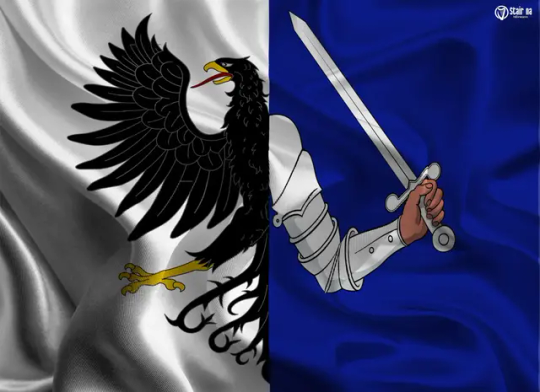
View On WordPress
#1798 United Irishmen Rebellion#Ballinamuck#British Army#Castlebar#England#France#French Revolutionary Army#General Jean Joseph Humbert#Irish Rebels#John Moore#Killala#Republic of Connacht#Republic of Ireland#The Year of the French
12 notes
·
View notes
Text
The Cranberries - Zombie 1994
"Zombie" is a protest song by Irish alternative rockband the Cranberries. It was written by the lead singer, Dolores O'Riordan, about the young victims of a bombing in Warrington, England, during the Troubles in Northern Ireland. The song was released on 19 September 1994 as the lead single from the Cranberries' second studio album, No Need to Argue. While the record label feared releasing a too controversial and politically charged song as a single, "Zombie" reached number 1 on the charts of Australia, Belgium, Denmark, Germany, and Iceland, and spent nine consecutive weeks at number 1 on the French SNEP Top 100. It reached number 2 on the Ö3 Austria Top 40, where it stayed for eight weeks. The song did not chart on the US Billboard Hot 100 chart as it wasn't released as a single there, but it reached number 1 on the US Billboard Alternative Airplay chart. Listeners of the Australian radio station Triple J voted it number 1 on the 1994 Triple J Hottest 100 chart, and it won the Best Song Award at the 1995 MTV Europe Music Awards.
The Troubles were a conflict in Northern Ireland from the late 1960s to 1998. The Provisional Irish Republican Army (IRA), an Irish republican paramilitary organisation, waged an armed campaign to end British rule in Northern Ireland and unite the region with the Republic of Ireland. Republican and Unionist paramilitaries killed more than 3,500 people, many from thousands of bomb attacks. One of the bombings happened on 30 March 1993, as two IRA improvised explosive devices hidden in litter bins were detonated in a shopping street in Warrington, England. Two people; Johnathan Ball, aged 3, and Tim Parry, aged 12, were killed in the attack. 56 people were injured. Ball died at the scene of the bombing as a result of his shrapnel-inflicted injuries, and five days later, Parry lost his life in a hospital as a result of head injuries. O'Riordan decided to write a song that reflected upon the event and the children's deaths after visiting the town: "We were on a tour bus and I was near the location where it happened, so it really struck me hard – I remember being devastated about the innocent children being pulled into that kind of thing. So I suppose that's why I was saying, 'It's not me' – that even though I'm Irish it wasn't me, I didn't do it. Because being Irish, it was quite hard, especially in the UK when there was so much tension." The song was re-popularised in 2023 after it was played after Ireland games at the 2023 Rugby World Cup. It was picked up by fans of the Irish team, with videos of fans singing the song in chorus accumulating hundreds of thousands of views on social media. This offended other Irishmen, who identified it as an "anti-IRA" anthem, and said that that the lyrics failed to consider their experience during the Troubles.
The music video, directed by Samuel Bayer, was filmed in Belfast, Northern Ireland, in the heart of the Troubles with real footage, and in Dublin. To record video footage of murals, children and British Army soldiers on patrol, he had a false pretext, with a cover story about making a documentary about the peace-keeping efforts in Ireland. Bayer stated that a shot in the video where an SA80 rifle is pointed directly at the camera is a suspicious British soldier asking him to leave, and that the IRA were keeping a close look at the shoot, given "the British Army come in with fake film crews, getting people on camera.” While "Zombie" received heavy rotation on MTV Europe and was A-listed on Germany's VIVA, the music video was banned by the BBC because of its "violent images", and by the RTÉ, Ireland's national broadcaster. Instead, both the BBC and the RTÉ opted to broadcast an edited version focusing on footage of the band in a live performance, a version that the Cranberries essentially disowned. Despite their efforts to maintain the original video "out of view from the public", some of the initial footage prevailed, with scenes of children holding guns. In March 2003, on the eve of the outbreak of the Iraq War, the British Government and the Independent Television Commission issued a statement saying ITC's Programme Code would temporarily remove from broadcast songs and music videos featuring "sensitive material", including "Zombie". Numerous media groups complied with the decision to avoid "offending public feeling", along with MTV Europe. Since it violated the ITC guidelines, "Zombie" was placed on a blacklist of songs, targeting its official music video. The censorship was lifted once the war had ended. In April 2020, it became the first song by an Irish group to surpass one billion views on Youtube.
"Zombie" received a total of 91% yes votes!
youtube
#finished#high votes#high yes#high reblog#low no#90s#the cranberries#english#o1#o1 sweep#o1 ultrasweep#o234#popular
3K notes
·
View notes
Text
And today I found out that all the weird BS that I've gone through so far in my life and all the BS my dad has gone through in his life haunts some of the people I know.
It's normal for me, so I shrug it off.
Example of convo:
me: -talking about family member who pissed someone off enough to warrant having a pipe bomb put on their porch-
friend: that's not the only bomb your family's dealt with
me: no?
friend: when you were in England
me: oh! No, the IRA (Irish Republic Army) threatened to bomb Windsor Castle while I was in it
friend: no, there was another time where there was an actual bomb
me: you mean when they found dynamite next to the railroad tracks when I was in Edinburgh? That was from an old construction site.
other friend: it's wild that we have to specify to find out which time that happened
#people really do wonder how I'm alive#there's also a running joke about the family curse#and all three of those instances are real#weird shit happens if I leave the US#still aren't entirely sure what the family member did to warrant having such a delivery
144 notes
·
View notes
Text




The Irish Guards were formed on 1 April 1900 by order of Queen Victoria to commemorate the Irishmen who fought in the Second Boer War for the British Empire. Some historians estimate that Irish recruits by 1900 made up 40% of the British army. Today, the Irish Guards is made up of mainly Northern Irish, British people with Irish ancestry and people from the Republic of Ireland. Every St Patrick’s Day since 1901 a member of the Royal Family presents the serving soldiers with shamrock.
53 notes
·
View notes
Text
I think something missing in Avatar is different accents for the voice actors. I think Aang must have a strong accent that he can't seem to get rid of, but no one recognizes his accent because the air nomad's accent hasn't been heard in a hundred years. I think that the northern water tribe and the southern water tribe should have different accents, and that Gran Gran's southern accent should be slightly different from Katara and Sokka's accent, because she is not really from the southern water tribe, and could not imitate the southern accent perfectly despite all her years in the tribe. I think the Earth Kingdom should have dozens of different accents, and that Zuko and Iroh know how to imitate some of the accents so well that someone yells at Jet that no firebender can imitate an Earth Kingdom accent, certainly not that well, so stop bothering poor Lee. I think Ba Sing Se's upper rings and lower rings should have amazingly different accents, and Toph should mimic the lower rings' accent when she's the blind bandit. I think the royal family and aristocracy of the Fire Nation should have a haughty Oxford accent, the poor townspeople a Cockney accent, and the country people a Scottish or Welsh or Irish accent. I think Kyoshi Islanders should have their own accent, different from any other accent in the Earth Kingdom, and so should the Sand benders. I think Tenzin should have exactly the same accent as his father, but when he's angry he slips into his real accent, a combination of his mother's accent and his father's accent with touches of a Republic accent. I think Mako and Bolin should have a New York accent, of the Republic, with a hint of an Earth Kingdom countryside accent, with Mako having more of his father's accent than Bolin, but when he's in Kubira's army, Bolin makes an effort to speak in his father's accent. I think Korra should have an accent similar to Gran Gran's, having grown up with a Southern Water Tribe mother and mentor, but with a Northern Water Tribe father. I think that Zuko, who was close to his mother growing up in the village, should have a bit of her accent in his youth, as opposed to Azula's perfect accent, and part of his journey is to return to speaking in this, his original accent, which is related to his mother. I think an avatar should have accents.
#avatar the legend of korra#avatar the last airbender#avatar aang#gran gran#lok bolin#lok mako#katara#zuko#azula#avater kora#toph beifong#uncle iroh#sokka#the avater world
104 notes
·
View notes
Text
And just the parallels these people are drawing, trying to insult me, an Irish person, when I’m talking about freeing Palestine. They’re sooo telling.
All these people demanding Palestinian activists tell them whether or not they “condemn Hamas”, which is just such bullshit and a bad faith question. I highly recommend watching the interview the Palestinian ambassador gave on the bbc, just completely obliterating this question. But yes these people will then turn around to me as soon as I speak on Palestine, and ask “do you condemn the IRA!?!?!”.
Once again asked by people without a shred of knowledge on the history of Ireland or Palestine.
First, on the IRA. The IRA (Irish Republican Army) was formed in 1917 from the members of the Irish Volunteers and the Irish Citizen Army. Notice the key words “volunteers” and “citizen”. It was never an army, just a volunteer resistance force of Irish citizens. They didn’t even have weapons at the start. They would train in the woods holding hurls to substitute guns. It wasn’t until the risings when they received weapons donated by other nations supporting the Irish gaining freedom.
More Irish people (who didn’t have the army training the British forces had) were killed and imprisoned by the British, than they killed the British. Various risings and civil wars continued until the Republic came to be in 1948. The six counties of the North are still of course under British rule.
My point is, people (*cough cough* Americans) who “love” Ireland and are so happy that Ireland gained freedom, then turn around and ask us to “condemn the IRA/ Hamas”…
I’m not even going to go into the fact that the IRA has since splintered off into a million different factions and some of them are involved in organised crime, blah, blah. Because again, “condemning the IRA” for gaining freedom for the republic because of the later actions of SOME of them, is just bad faith!
People looovvvee Ireland and Irish culture and are glad the republic exists and are “sad” for the North, but don’t want to acknowledge that we’ve only come this far by violent resistance! If we could’ve just asked real nice for England to fuck off, in the 700 years they occupied us, we would’ve! Peace talks don’t do shit when one side is a colonising power that doesn’t want to leave the other alone!
And again, it’s assuming that colonisation and apartheid states aren’t violent themselves. In both Palestine and Ireland, our oppressors subjugated and forced us into unimaginable conditions for so fucking long. Then when people try to oppose them, they’re called terrorists?
I mean shit, you Americans even have your 4th of July where you celebrate how you guys violently overthrew the English and gained independence. Do we condemn those soldiers for killing British soldiers? I mean every Independence Day of every country involves form of violent rebellion… that’s how shit gets done.
Hamas is a small resistance group. The IDF is a literal army with actual training and the world’s best weapons provided by the biggest powers of the world. EVEN IF somehow Hamas was a big scary terrorist organisation with military grade weapons, what Israel is doing has nothing to do with Hamas. They are bombing fucking children, hospitals, refugee camps, journalists!! All of which are fucking war crimes.
Israel is flooding social media with propaganda about how the hospitals were “Hamas headquarters”. Taking pictures of a board with the days of the week in Arabic and claiming it’s “Hamas terrorist plans”.
This is what the English depicted us as, and it’s what Israel will depict Palestine as. Of course we’re going to support them.
A great quote from on of my favourite films (Pride, 2014) is: “I don’t believe the papers when they talk about us, why should I believe it when they talk about them?”.
152 notes
·
View notes
Photo

Consequences of the English Civil Wars
The impact and consequences of the English Civil Wars (1642-1651) were many and far-reaching. Charles I of England (r. 1625-1649) was executed, and the monarchy was abolished. Oliver Cromwell (1599-1658) then headed the Republic as the Lord Protector of England, Scotland, and Ireland. For many commoners, their lands and property were confiscated, taxes were higher than ever, and they suffered death and disease like never before. Finally, the uncertainty of just how to replace the monarchy brought forth a spring of new groups with new ideas on how to live, how to interpret the Bible, and what should be the obligations and responsibilities of those who governed them.
The main consequences and impact of the English Civil Wars include:
Execution of Charles I
Exile of Charles II to France
Abolition of the monarchy in England
Abolition of the House of Lords
Abolition of the Star Chamber
Reforms in the Anglican Church
Increase in the powers of the English Parliament
A wave of new and radical ideas concerning religion and politics
A boom in printed material, especially by various religious groups
People were subjected to high taxes and duties to pay for the wars
Many Irish Catholics had their land confiscated
The Scottish Kirk was dissolved
Scotland and Ireland sent members to the Westminster Parliament
Creation of a permanent and professional army
Royalist and church estates were sold off
Destruction of historic castles, buildings, and towns in all three kingdoms
Around 100,000 deaths in battle
Around 100,000 civilian deaths
Continue reading...
28 notes
·
View notes
Note
Hi!
Im also watching Say Nothing and its really good! I also started to read the book. As an Irish person can you give me your perspective about it?
Sorry I completely missed this yesterday. I was binging the last few episodes, I couldn't tear myself away.
I thought Say Nothing was really good. It is such a complex and difficult subject with no clear right or wrong, only dark and shade. I liked that the series didn't try to give easy answers or take a moralistic stance. I think it portrayed the awful, messy complexity of the war as well as a piece of television could. I am sure it will provoke a breadth of differing opinions, and some will be angry, but I think it was a truly excellent attempt to portray this painful chapter in history with some nuance.
And not only that, but to make this story into such bingeworthy, pacy, riveting television without falling for Hollywood cliches and pat cliffhangers? I don't think I quite believed that was possible in a series about the war in Northern Ireland.
The acting was fantastic, such brilliant casting matches for the young & old versions of the characters! Lola Petticrew, Hazel Doupe and Anthony Boyle were particularly great, and I'm so glad that they chose West Belfast actors for two of those roles. I thought they were incredible.
But giving my perspective "as an Irish person" is kind of complicated. As an Irish person from the Republic I've had a completely different experience of events in the North compared to anyone who grew up there. A completely different personal relationship with our history. One of the strengths of Say Nothing for me was how it portrayed this contrast in the later episodes set in the '90s. My brain is still melted from being confronted with so many shades of the conflict all at once. Every time I felt conflicted about a scene, a later scene would address that conflict - not offering solutions or answers, but acknowledging that there were multiple other perspectives. Powerful stuff!
Growing up in the south, most of us had the option to tune out what was happening, to go about our days without our lives being directly impacted by the war. When I was very little, it was on the news every single night and I knew that after the grown-ups had had a few drinks, you didn't want the subject raised. But despite trying to figure out the words to U2's 'Sunday Bloody Sunday', my childhood understanding didn't really go beyond "We want the Brits out but they won't leave because the Protestants want them to stay and there are more of them than Catholics, and they'll probably keep killing each other forever and I really wish it could stop"
I never experienced British bigotry towards me personally as an Irish person until I was actually in England - it's something every Irish person anticipates in their bones, but it wasn't in my face growing up.
I never even went across the border until I was 16 years old. I went to see a British band play in Belfast (think of that episode of Derry Girls where they travel to Belfast to see Take That, if the Derry Girls were from Dublin and they were going to see a punk band, not a boyband). My parents wouldn't let me go because they said it was too dangerous, but I went anyway. They were right. There was a bomb scare on the train on the way there and another bomb scare at the club after the gig. My friends and I were totally out of our depth. At 4am we fucked up and called the wrong taxi service to take us to a Catholic area and had army rifles pointed in our faces at a checkpoint. We were young and didn't know what we were doing and couldn't quite grasp that this was reality. It was frightening and sobering, and I did not go back until after the ceasefire a couple of years later.
So that was the luxury of being raised in the south - I didn't have to think about it most of the time. A luxury no-one growing up in the North had. So as an Irish person I have a load of thoughts about Say Nothing, but I'm especially interested in what Northern Irish people have to say about it.
32 notes
·
View notes
Text
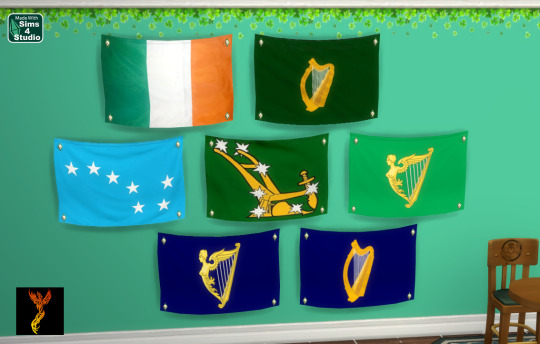
Irish Flags
Top Row: Irish Tricolor, The Green Harp Flag
Middle Row: 2 versions of the Starry Plough, Irish Confederacy Flag
Bottom Row: Kingdom of Ireland Flag, Irish Presidential Standard Flag
DOWNLOAD for FREE: SFS
OR at Patreon*
*You must be over 18 to access my Patreon page.
Creations by SexyIrish7
This cc object was produced as a selective clone using Sims 4 Studio.
Swatch 1: Irish Tricolor - National Flag of the Republic of Ireland (first used in 1848, officially adopted in 1937
Swatch 2: The Green Harp Flag - First used in 1642, later considered to be the unofficial Irish Flag from 1798 until 1916
Swatches 3-4: The Starry Plough - Originally used by the Irish Citizen Army under the leadership of James Connolly in 1916. Represents the struggle of the common man.
Swatch 5: Irish Confederacy Flag Used during Irish Confederate Wars 1642-1652
Swatch 6: Kingdom of Ireland Flag Used 1542-1800
Swatch 7: Irish Presidential Standard Flag Used since the 16th century
Polygon Count: 952
All CC have:
*Ability to search catalog using search terms: sexyirish7 and si7
*Customized thumbnail
*******
CREDITS:
Software credits:
Sims 4 Studio v. 3.2.3.5 (Star): https://sims4studio.com
GIMP v. 2.10.34: https://www.gimp.org/
Inkscape v. 1.2: https://inkscape.org/
Thank you to the creators and moderators producing tutorials and answering questions!
*******
Image Credits:
Easter Pin: https://irishpatriotstore.com/product/easter-lilly-badge/
Swatches 1-2: public domain and https://www.shanore.com/blog/the-irish-flag-and-its-history/
Swatches 3-4: https://irishstudies.sunygeneseoenglish.org/the-starry-plough-flag/
Swatches 5-7: https://www.theirishpassport.com/2021/04/07/flags-discussed-in-our-latest-episode/
*******
TOU:
Do not re-upload and claim as your own
Do not re-upload and hide behind a paywall
16 notes
·
View notes
Note
I know we don’t talk, and I apologize for not reading your fic, but I am so interested in knowing about these folk songs!
Well we are talking RIGHT NOW my friend, so thank you for the ask and the excuse to nerd out for a bit! (I will literally talk to anyone regardless of how much we've ever interacted directly, never be afraid of shooting me an ask!)
I have a personal interest in leftist and anti-fascist folk song--think the IWW Little Red Songbook--and also anti-war protest song. So for this chapter of the fic, in which essentially the clones and Partisans are all having a night off together and hanging out around a fire drinking, I really wanted to play around with what sort of songs the clone army might sing for morale in their camps at night! The clones are in a unique situation where they might have songs that are both pro-war (think Republic propaganda songs) but also songs that could be construed as anti-war, mourning the violence and losses they've experienced. But because there's also a Republic Navy, I was really interested in the idea that they might sing sea shanties or other work songs.
Basically I wanted the scene to move through a few examples that could unite the clones and Partisans as they're working together against the Empire at this moment in the story. I imagine during the Clone War the Partisans were looking toward the clone army for inspiration, out in the jungle listening to Republic radio broadcasts as they train to fight back against the Separatists. So there's a lot of history there.
I start off with a shanty called "A Drop of Nelson's Blood" (which I've adapted to "A Drop of Dooku's Blood"). You can listen to a version here:
youtube
"Nelson's Blood" is a term for rum, so essentially this is a work song on sailing ships where they call for things they miss while they're at sea, like a good drink! I can just imagine the clones in the middle of a rough campaign basically singing about how they wouldn't mind having a shore leave and getting drunk for a bit. (A side note--some of the lyrics and a bit of the melody is adapted into the leftist song "Roll the Union On.")
The next song I feature is just the chorus from "Barrett's Privateers," which in the fic I claim is an old pirate song that the clones in the Republic navy really liked. In reality, it's a modern shanty by Stan Rogers telling the story of a failed privateering expedition. I liked it for the clones because the chorus essentially laments the broken promise that was made to the singer, that they would succeed easily in their mission, but now he's left alone, the only one still alive. It feels very Rex to me.
youtube
The next song is the pure 1940s anti-fascism of Woody Guthrie, "All You Fascists Bound to Lose." In the fic I situate it as an anti-Separatist, Republic propaganda song, which the Partisans have now adapted to be about fighting the Empire. The messaging is about the surety of being able to win if the people organize and unite together against oppression.
youtube
I also have a reference in the fic to the U.S. military marching cadence "I Wish that All the Ladies," which is essentially a series of sexual puns. It was too hard for me to try to adapt the puns to a Star Wars context, apart from the title, which I wrote as "I Wish that All the Laat/is."
The fic then takes a more somber tone, with Rex requesting that Dara play a more grief-stricken song of mourning for him. This is based on the anti-war song "Johnny, We Hardly Knew Ye," which is sung from the point of view of an Irish woman whose lover became a soldier and is now returning with his body badly damaged by the violence of war. This feels very appropriate for Rex and Echo for me--that they've both witnessed and experienced some of the very worst of what war can do to the people who are used as cannon fodder. I adapted the lyrics to "Shiny, We Hardly Knew Ye," making it a lament for the shinies who were lost in their first battles off Kamino (and so, in a certain way, a lament for the other members of Domino Squad). I like Joan Baez's version, because I love Joan Baez.
youtube
Finally, the last song I adapt for this chapter of the fic is the Italian anti-fascist song "Bella Ciao." The name for Saw Gerrera's Partisans in Star Wars comes, of course, from the Italian anti-fascists who fought against the Nazis and Mussolini, and this song celebrates their role in the resistance. Mitski posted an English version on Youtube a few months ago that I really love, so I used her translation to make my own adaptation, with the song celebrating Steela Gerrera as a martyr for the Partisan cause who is an inspiration for those who continue fighting against the Empire.
youtube
I also wrote a version of "John Brown's Body," a U.S. Civil War song about the abolitionist John Brown who was executed after a raid on a U.S. arsenal, but it just didn't quite fit into the chapter. And there we have it!
Thanks again for the ask and for indulging in my (perhaps somewhat niche) interest!
7 notes
·
View notes
Text
New headcanon/theory:
The story that Steve's father was killed in action in the First World War was a lie.
He did die in combat, but not when Steve and Sarah claimed he did. He actually died in the Anglo-Irish War that took place between 1919 and 1921, which resulted in the creation of the Republic of Ireland as an independent nation and the annexation of the six northern counties which today make up modern Northern Ireland, and are a part of the United Kingdom. It was a war that was fought between Irish republican resistance fighters, the British army, and Ulster loyalists.
What if Steve's father was one of those republicans, who went home to fight British imperial rule in his home country and never made it back?
It would also explain a lot of where Steve's radical politics came from, and why they would have to make up a lie to hide the real reason Joseph Rogers died. Why Steve was so eager to join the Second World War and fight back against another, different, kind of bully.
Just a thought.
#personal#steve rogers#marvel#mcu#80s au where steve joins up with the IRA in the middle of the troubles#aggressively irish steve rogers is my favourite steve rogers#is this anything idk#probably not likely to be realistic but oh well
15 notes
·
View notes
Text

On this day in … 1868, James Connolly was born in Edinburgh, Scotland. He was a Scottish-born Irish republican, socialist, and trade union leader, executed for his part in the 1916 Easter Rising against British rule in Ireland. He remains an important figure both for the Irish labour movement and for Irish republicanism.
He became an active socialist in Scotland, where he had been born in 1868 to Irish parents. On moving to Ireland in 1896, he established the country’s first socialist party, the Irish Socialist Republican Party. It called for an Ireland independent not only of Britain’s Crown and Parliament, but also of British “capitalists, landlords and financiers”.
From 1905 to 1910, he was a full-time organiser in the United States for the Industrial Workers of the World, choosing its syndicalism over the doctrinaire Marxism of Daniel DeLeon’s Socialist Labor Party of America, to which he had been initially drawn. Returning to Ireland, he deputised for James Larkin in organising for the Irish Transport and General Workers Union, first in Belfast and then in Dublin.
In Belfast, he was frustrated in his efforts to draw Protestant workers into an all-Ireland labour and socialist movement but, in the wake of the industrial unrest of 1913, acquired in Dublin what he saw as a new means of striking toward the goal of a Workers’ Republic. At the beginning of 1916, he committed the union’s militia, the Irish Citizen Army (ICA), to the plans of the Irish Republican Brotherhood, and the Irish Volunteers, for war-time insurrection.
Alongside Patrick Pearse, Connolly commanded the insurrection in Easter of that year from rebel garrison holding Dublin’s General Post Office. He was wounded in the fighting and, following the rebel surrender at the end of Easter week, was executed along with the six other signatories to the Proclamation of the Irish Republic.
digital art hand drawn by @pyrotoons
#drawings#drawing#portrait#sketches#sketch#history#sketchbook#illustration#digital art#digital illustration#digital drawing#drawing sketch#portrait drawing#irish history#Ireland#easter rising#Revolution#Irish civil war#irish republican army#anti colonialism#anti imperialism
4 notes
·
View notes
Text
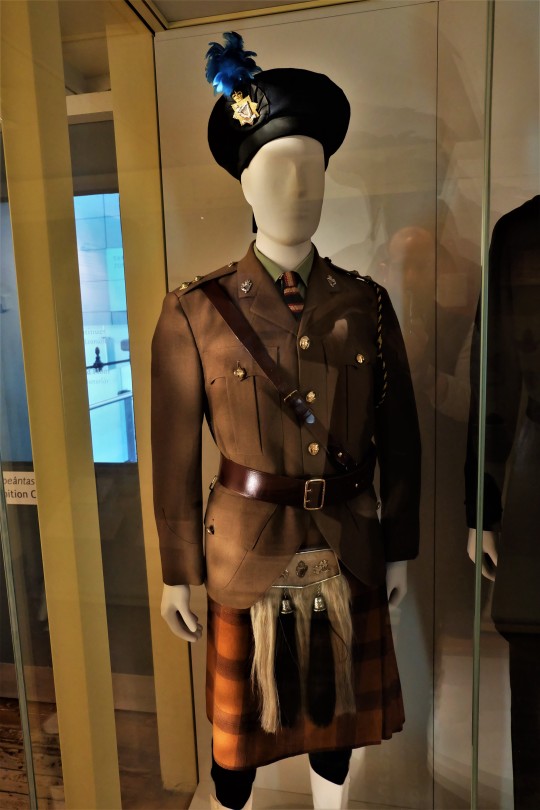
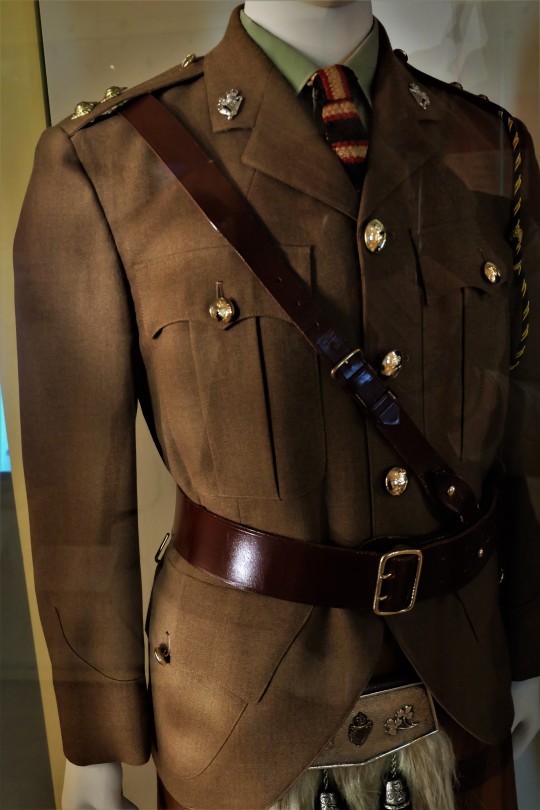
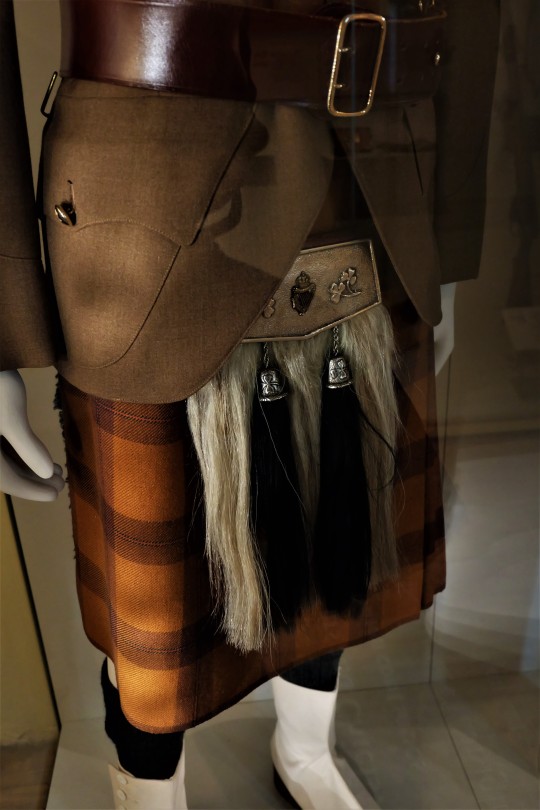
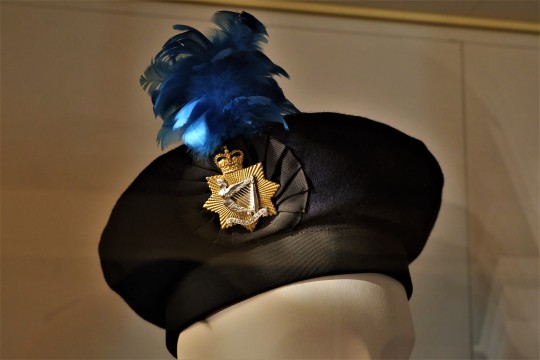
Officer's Uniform of The Irish Regiment of Canada from Canada dated to 1959 on display at the National Museum of Ireland-Decorative Arts and History in Dublin, Republic of Ireland
Across the British Empire and in other countries Irish immigrants formed regiments in the national armies of these countries. They often used Irish symbols and national dress to identify themselves but the Irish Regiment of Canada from 1931 used the Scottish kilt and the balmoral cap making them the only kilted Irish regiment in the world.
Photographs taken by myself 2017
#uniform#art#military history#fashion#ireland#irish#20th century#national museum of ireland#dublin#barbucomedie
25 notes
·
View notes